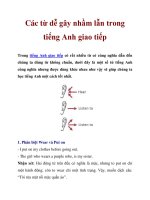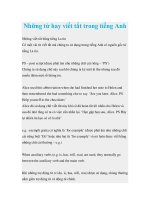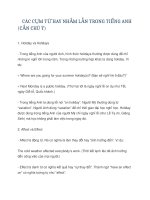Những từ dễ nhầm lẫn trong tiếng anh 1 pdf
Bạn đang xem bản rút gọn của tài liệu. Xem và tải ngay bản đầy đủ của tài liệu tại đây (166.34 KB, 6 trang )
MOPING
OR
MOPPING?
mischief
See
EI/IE
SPELLING RULE.
mischievous
(not
mischievious,
as it is
often mispronounced)
misplace
See
DISPLACE
OR
MISPLACE?.
misrelated
participles
See
PARTICIPLES.
misspell
mis +
spell
misspelled/misspelt
Both
spellings
are
correct.
mistletoe
moccasin
modern
(not
modren)
moment
(not
momment)
momentary
or
momentous?
MOMENTARY
=
lasting
for
only
a
very short time
MOMENTOUS
= of
great significance
monastery
(singular) monasteries (plural)
(not
monastry/monastries)
See
PLURALS (iii).
mongoose
(singular) mongooses (plural)
(not
mongeese)
monotonous
moping
or
mopping?
mope
+ ing =
moping
mop + ing =
mopping
See
ADDING
ENDINGS
(i) +
(ii).
139
MORAL
OR
MORALE?
moral
or
morale?
Use
these exemplar sentences
as a
guide:
Denise
is
guided
by
strong
MORAL
principles.
My
MORALE
suffered
badly when
I
failed
my
exams
and I
lost
all
faith
in
myself
for
years.
Morocco
mortgage
(not
morgage
as it is
pronounced)
mosquito
(singular) mosquitoes (plural)
See
PLURALS (iv).
motto
(singular) mottoes
or
mottos (plural)
See
PLURALS (iv).
mould
mouldy
moustache
mucous
or
mucus?
MUCOUS
is an
adjective,
as in
MUCOUS
membrane.
The
name
of the
thick secretion
of the
mucous
membrane
is
MUCUS.
murmur
murmured,
murmuring (not murmer-)
mustn't
This
is the
contracted form
of
'must
not'.
Take
care
to
place
the
apostrophe
carefully.
must
of
This
is an
incorrect
construction.
See
COULD
OF.
mute
-e
Also
known
as
magic
-e and
silent
-e.
See
ADDING ENDINGS (ii).
140
MYTH
mutual
reciprocal
Our
dislike
was
MUTUAL.
Their marriage
is
based
on
MUTUAL
respect.
Some
would avoid
the use of
'mutual'
in
expressions
such
as
'our
mutual
friend'
because
a
third person
is
then introduced
and the
feelings
of
each person
for
the
other
two are not
necessarily identical.
It
might
be
best here
to
describe
the
friend
as one
'we
have
in
common'.
myself
See
I/ME/MYSELF.
myth
See
LEGEND
OR
MYTH?.
141
naive/naive
Both forms
are
correct.
naivete/naivete/naivety/naivety
All
these forms
are
correct.
nationalise
or
naturalise?
to
NATIONALISE
= to
transfer
ownership
from
the
private sector
to the
state
to
NATURALISE
= to
confer
full
citizenship
on a
foreigner
nebula
(singular) nebulae
or
nebulas (plural)
See
FOREIGN PLURALS.
necessary
necessity
negatives
See
DOUBLE NEGATIVES.
neighbour
See
EI/IE
SPELLING RULE.
neither
See
EI/IE SPELLING RULE.
neither
.nor
Compare
EITHER OR.
nephew
-ness
Take
care when adding this
suffix
to a
word already
ending
in -n. You
will have double
n:
cleanness
openness
suddenness
142
ra
NONE
neumonia
Wrong
spelling.
See
PNEUMONIA.
new
See
KNEW
OR
NEW?.
niece
See
EI/IE
SPELLING
RULE.
nine
ninth
nineteen
nineteenth
ninety
ninetieth
no
See
KNOW
OR
NO?.
no
body
or
nobody?
Use
these exemplar sentences
as a
guide:
It
was
believed that
he had
been murdered
but NO
BODY
was
ever found,
and so
nothing could
be
proved.
(=
no
corpse)
NOBODY
likes going
to the
dentist.
(=
no
one)
none
The
problem with
'none'
is
deciding whether
to use
with
it a
singular
or a
plural verb.
Strictly
speaking,
a
singular verb should accompany
'none':
NONE
of the
passengers
WAS
hurt.
(=
not
one)
NONE
of the
milk
WAS
spilt.
(=
not
any)
Colloquially,
a
plural verb
is
often
used when plural
nouns follow
the
'none
of '
construction:
NONE
of the
passengers
WERE
hurt.
NONE
of my
friends
LIKE
pop
music.
143
NO ONE
NONE
of the
children
WANT
an
ice-cream.
Some
reserve plural verbs
in
these cases
for
informal
occasions; others would
see
them
as
perfectly
acceptable formally
as
well.
no
one
'No
one'
is
singular
and
requires
a
singular verb:
NO
ONE
likes meanness.
'No
one'
should
be
written
as two
words
and not
hyphenated.
nosey/nosy
Both
spellings
are
correct.
Note-,
for
informal
use
only.
noticeable
(not
noticable)
See
SOFT
c
AND
SOFT
G.
not
only
but
also
Take
care with
the
positioning
of
each part
of
this
pair:
Denise
not
only enjoys composing
but
also
conducting.
Denise
enjoys
two
musical activities: composing,
conducting.
Put
'not
only'
in
front
of the first and
'but
also'
in
front
of the
second,
and let
'enjoys'
refer
to
both.
Denise
enjoys
NOT
ONLY
composing
BUT
ALSO
conducting.
Compare
BOTH AND
;
EITHER OR
;
NEITHER NOR.
nouns
There
are
four
kinds
of
nouns: common,
proper,
abstract
and
collective.
144









